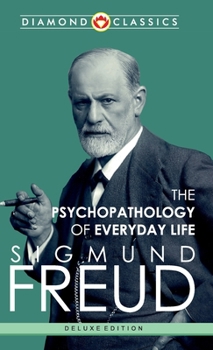The Psychopathology of Everyday Life
Select Format
Select Condition 
Book Overview
'The Psychopathology of Everyday Life' by Sigmund Freud is an exploration of the unconscious mind and its influence on our daily actions. He also discusses the role of repression, memory, and childhood experiences in shaping the unconscious mind.
This book remains a classic work in psychology and a must-read for anyone interested in understanding the complexities of the human mind. Freud's pioneering ideas have had a lasting impact on both academic psychology and popular culture, making this book a timeless exploration of the hidden forces that guide our everyday actions.
This book remains a classic work in psychology and a must-read for anyone interested in understanding the complexities of the human mind. Freud's pioneering ideas have had a lasting impact on both academic psychology and popular culture, making this book a timeless exploration of the hidden forces that guide our everyday actions.
Format:Hardcover
Language:English
ISBN:9359648191
ISBN13:9789359648194
Release Date:September 2024
Publisher:Diamond Magazine Private Limited
Length:194 Pages
Weight:0.87 lbs.
Dimensions:0.6" x 5.5" x 8.5"
Customer Reviews
5 ratings
Understanding 'Freudian Slips'.
Published by Thriftbooks.com User , 15 years ago
This book has possibly done more than any other book to popularise psychology. Freud wrote it deliberately for the ordinary reader at the turn of the 20th century and, as fresh editions appeared, constantly added new illustrations and anecdotes without changing his basic theories. Here, with brief examples, we have the simple but convincing explanations of things that are familiar to everybody: the sudden forgetting of proper names, of sets of words, impressions and intentions, childhood and 'screen' memories; bungled actions and other errors; and all those little, significant mistakes of tongue and pen that have come to be called 'Freudian slips'.
Intriguing, Logical, and Plausible (!)
Published by Thriftbooks.com User , 17 years ago
This is a fantastic, captivating book. The theories and ideas outlined in "Psychopathology of Everyday Life" are logical and seem more applicable, plausible, and realistic (i.e. more easily seen in everyday life) than some of Freud's other theories. Highly recommended for anyone interested in psychology, character, human behavior, or Freud's work. Covers a lot about human memory. A very good resource to have.
Intricate book
Published by Thriftbooks.com User , 18 years ago
It is an intricate book for those readers who love Psychology and want to discover more. The content is difficult to comprehend because Freud used a terminology that is easy to grasp by psychologists/psychiatrists. You will need another source (dictionary, person in the domain of Psych)to help you understand what he is talking about. However,I loved "The Psychopathology of Everyday Life" and I recommend to all to buy it. As I mentioned, it is an intricate book!!
Easy for the lay reader to understand
Published by Thriftbooks.com User , 21 years ago
The republication of this authorized English edition which appeared in 1914 will enable libraries to replace aging volumes with a fresh, affordable paperwork. This remains one of Freud's most widely recognized titles, blending anecdotal accounts with his personal experience and psychological insights. His first-person, chatty tone makes it easy for the lay reader to understand his concepts of underlying psychological influences.
The Unconscious' work trough parapraxes (faulty actions)
Published by Thriftbooks.com User , 21 years ago
This book may be read as a necessary sequel to Freud's major opus The Interpretation of Dreams, cause the object of the two are the same, that is, to demonstrate trough a lot of very detailed personal and third person's examples, how the unconscious work, or even better, how it betrays itself trough its concealed (condensed and displaced) actions shown in our parapraxis of everyday. Parapraxis is a term which could be translated into faulty acts, which are, for instance, "slips of the tongue", "slips of the pen", misreadings, mislayings of objects, undeliberate forgetness of sentences, names and places, etc ... The book is written in a very casual style and one is again admired how could such a genius as Freud convey his ideas in such an easy style. Why no 4 stars? Because I think this book is not so fascinating as The Interpretation of Dreams, an opus which deserves 5 stars.






